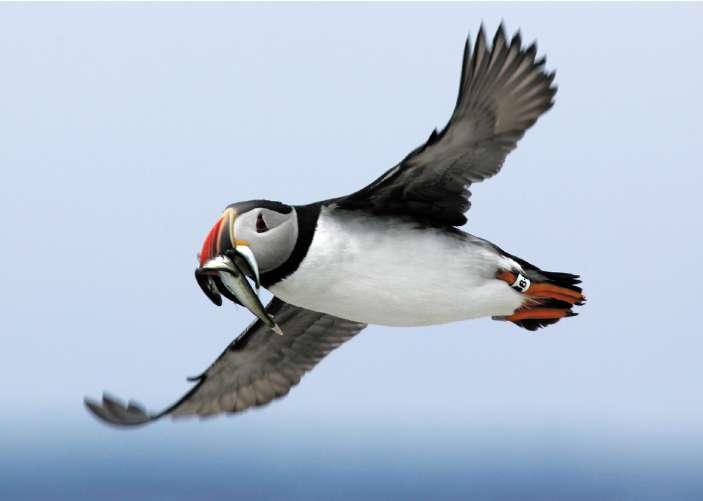Warmer seas blamed for rapid decline of Scottish puffin colony

Your support helps us to tell the story
From reproductive rights to climate change to Big Tech, The Independent is on the ground when the story is developing. Whether it's investigating the financials of Elon Musk's pro-Trump PAC or producing our latest documentary, 'The A Word', which shines a light on the American women fighting for reproductive rights, we know how important it is to parse out the facts from the messaging.
At such a critical moment in US history, we need reporters on the ground. Your donation allows us to keep sending journalists to speak to both sides of the story.
The Independent is trusted by Americans across the entire political spectrum. And unlike many other quality news outlets, we choose not to lock Americans out of our reporting and analysis with paywalls. We believe quality journalism should be available to everyone, paid for by those who can afford it.
Your support makes all the difference.Atlantic puffins, until recently one of the North Sea's rare wildlife success stories, are joining the ranks of dwindling birdlife after new data revealed their numbers on a crucial island colony are in sharp decline.
Researchers on the Isle of May, home to the largest puffin colony in the North Sea, have found that after 40 years of steady increase the resident population has plummeted by almost a third in the past five years.
The Scottish island has been at the centre of the UK's research into puffins for more than three decades, and findings are often seen as an indication of the state of the birds nationally.
Mike Harris, emeritus professor for the Centre for Ecology and Hydrology, who conducted the research, said the news was alarming. "This is a warning", he said. "We've been working on puffins on the island since 1972, and this is the first time I've been concerned that something has gone wrong in their environment".
"We thought the rate of increase would continue, and that this year we'd end up with 100,000 pairs, but instead we found that not only had it not gone up, but it had gone down."
Puffin numbers on the island have fallen from 69,300 pairs of the birds in 2003 to 41,000 pairs today. When the centre last surveyed the birds in 2003, their population was still increasing at a rate of about 10 per cent a year, making this downturn all the more unexpected.
The exact cause of the dramatic fall in numbers remains a mystery, but Professor Harris believes the decline could be the result of climate change. He says that as the seas warm up, it is affecting the numbers of fish available for the puffins to eat.
"We think there's been some change in their native environment in the last couple of years. One possibility is that there's been a big change in the sea, from intense fishing and marine climate change. This has affected the development of plankton, which in turn has an impact on the numbers of fish for the puffins to eat."
The number of sand eels – which are a staple food for the birds – has been falling in recent years as a result of overfishing and sea temperature changes. Puffins are excellent bio-indicators for the health of the environment, as they sit near the top of the ocean's food chain, which makes news of their decline all the more worrying.
Scientists have discounted the idea that such a sudden dip in numbers could be because of inefficient breeding or the loss of chicks, as puffins usually live for up to 30 years. "Because puffins are so long-lived, even if they didn't have chicks, that wouldn't affect the population drastically for a long time", said Professor Harris.
Previous reasons for reductions in puffin populations have been major incidents in their ecosystem, such as oil spills, but researchers say they are unaware of any large spills in the recent years.
Matt Parsons, a seabird expert at the Joint Nature Conservation Committee, said that the downturn in puffin numbers on the island could be a "warning sign" that the birds are dwindling nationally.
"It could be the sign of a national change, but we'll only know for certain when we get data back from other colonies," he said. "It's certainly interesting, as it's previously been a site where puffin numbers have gone up and up."
The first concrete sign of whether there is a national puffin crisis will come when the Farne Islands, another stronghold for the birds, conduct a census later this year.
Other North Sea birdlife in decline
Northern fulmars
In recent years, sightings of northern fulmars inland during winter has suggested a crisis in the North Sea: the birds normally spend the colder months far out at sea.
Razorbills
Thousands of dead razorbills, which had flown from the UK, were washed up on the Scandinavian coast last year. Their deaths, which appeared to be from starvation, raised concern about North Sea fish stocks.
Northern guillemots
In the Shetland islands, numbers of breeding northern guillemots are at their lowest since 1997. Scientists believe many have been starving to death.
Join our commenting forum
Join thought-provoking conversations, follow other Independent readers and see their replies
Comments